|
|
 |
| |
| QC
PLOTS |
| |
CURRENT |
HISTORY |
| IMG counts |
 |
 |
| IMG S/N |
 |
 |
| IMG rms |
 |
 |
| IMG plane_RMS |
 |
 |
| QC1
database (advanced users): browse
| plot |
Click on CURRENT
to see the current trending (Health Check).
Click on HISTORY
to see the historical evolution of the trending. |
ZIMPOL flat frames are taken during day time using the same readmode and broadband filter as the science observations. Narrowband filter science observations are calibrated with broadband filter flats of closest wavelength. Raw flats come as single files with one extension per CCD. Each extension is a data cube (NAXIS=3) with NDIT=NAXIS3 planes/layers. ZIMPOL product frames come as one file per CCD with several extensions each.
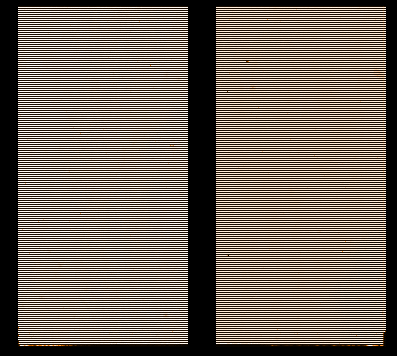 |
|
ZIMPOL raw flat frame (one plane of the cube) in StandardImaging readmode of one CCD (here CAM1). |
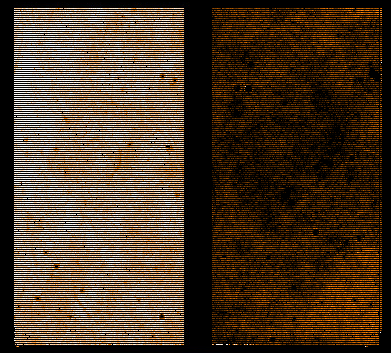 |
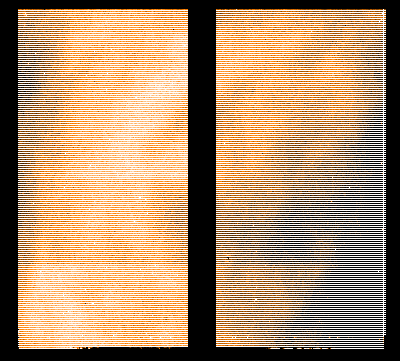 |
Left: ZIMPOL raw flat frame (first raw frame extension corresponding to chip1 = Callas) from above with cuts = 5800-6000 ADU to highlight the flat level and its structure in the odd rows of the CCD containing the lamp signal.
Right: ZIMPOL raw flat frame from above with cuts = 1100-1200 ADU to highlight the flat level and its structure in the even rows of the CCD. The signal is composed of the bias level plus some scattered light. |
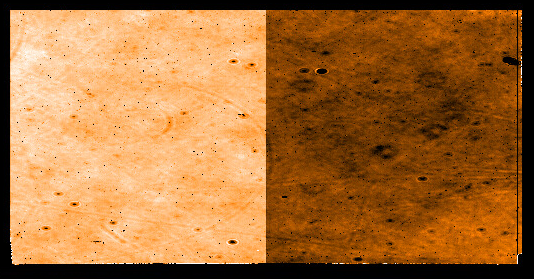 |
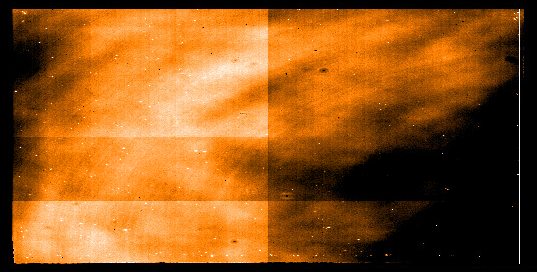 |
ZIMPOL flat product frame. Left: IFRAME extension showing the master flat based on the odd rows of the raw frame for CAM1 with the illuminated. Right: PFRAME extension, showing the master flat based on the even rows of the raw frame for CAM1 carrying a bias signal. |
QC1 parameters
(LOCAL means: there is no entry in the pipeline product fits header, the QC parameter is calculated by a QC script)
| parameter |
QC1 database: table, name in DB, name in header
|
procedure |
| |
imaging mode flats, dbname=sphere_zimpol_flat_img |
|
| counts |
qc_iframe_raw_med,
DRS.ZERO.ODD.RAW.MED.MEDIAN |
see pipeline user manul for details |
| S/N ratio |
qc_SNR_iframe
LOCAL
(QC script)
|
The bias subtracted signal of the raw frame is stored in DRS.DOUBLE.IMAGE.IFRAME.MED.MEDIAN (or PFRAME) which is multiplied by NDIT to get the total number of counts. The sqrt of this expression is called the signal-to-noise ratio. |
| rms |
qc_rms_iframe
QC.DOUBLE.IMAGE.IFRAME.RMS
|
The RMS of the IFRAME product, see pipeline user manul for details |
| counts per plane |
qc_plane_rms
LOCAL
(QC script) |
From a QC script: The median counts is retrieved for any plane of the raw frame data cube. The rms of the sample is derived. This QC parameter measures if all planes of the cube are illuminated or if some planes are affected by the shutter problem. |
| |
|
|
| |
polarimetric mode flats, dbname=sphere_zimpol_flat_pol |
|
| counts |
qc_rawmed_zero_odd DRS.ZERO.ODD.RAW.MED.MEDIAN |
Box 1 in HC plot, see pipeline user manual for procedure |
| S/N ratio |
qc_SNR_zero_odd
LOCAL
|
Box 2 in HC plot, subtract 900 ADU from each raw frame plane median (to correct for bias value) but take only the zero phase rows of the fits cube, sum counts over all NDIT (=NAXIS3) planes and take the sqrt. |
| counts |
qc_rawmed_pi_odd
DRS.PI.ODD.RAW.MED.MEDIAN |
Box 3 in HC plot, see pipeline user manual for procedure |
| S/N ratio |
qc_SNR_pi_odd
LOCAL
|
Box 4 in HC plot, subtract 900 ADU from each raw frame plane median (to correct for bias value) but take only the pi phase rows of the fits cube, sum counts over all NDIT (=NAXIS3) planes and take the sqrt. |
| rms |
qc_rms_zero_odd
QC.QUAD.IMAGE.ZERO.ODD.RMS |
Box 5 in HC plot, see pipeline user manual for procedure, the rms of the product frame |
| counts per plane |
qc_plane_med
LOCAL
|
Box 6 in HC plot, values retrieved as in Box 2, but take the median over all plane medians. |
| rms |
qc_rms_pi_odd
QC.QUAD.IMAGE.PI.ODD.RMS |
Box 7 in HC plot, see pipeline user manual for procedure, the rms of the product frame |
| counts per plane |
qc_plane_rms
LOCAL |
Box 8 in HC plot, values retrieved as in Box 2, but take the rms over the sample of plane medians. This QC parameter is senistive to the following effect: Any plane of the cube deviates in the number of counts from that of the rest of the planes. |
Trending
counts and rms are trended for a set of four broad band filters only. They come
- for both detectors (CAM1 and CAM2)
- in imaging mode for both cycles (I and P)*.
- in polarimetry mode for all four cycles (phase zero odd subcycle, phase pi odd subcycle, phase pi even subcycle, phase zero even subcycle).
*: The pipeline products (V 0.18.0) of the imaging flat field recipe are wrongly labeled I (for intensity) and P (for polarimetric degree) and the QC parameter naming scheme follows this wrong naming. The first four FITS product extensions labeled IFRAME are in fact the processed signal of the odd CCD rows carrying the image signal, while the second set of four FITS extensions labeled PFRAME contain the processed signal of the even CCD rows, which contain only the unilluminated bias signal.
History
temporarily unsupported:
From 2015-09-09 to 2016-06-01 all zimpol calibrations, for which a lamp is involved (flats, modemeff calibrations, and optical distortion pinhole images) show a deficit.
The deficit is described on the SPHERE problems page. Since the number of underexposed planes varies, the pipeline cannot handle these calibrations. Furthermore the calibrations might suffer from a lower sign-to-noise ratio. As an operational consequence the processing focus only on the monitoring of the issue via the qc_plane_rms QC parameter, which measures the rms of the sample of plane medians.
The health check plots have been taken off the main page and are available here: flats imaging mode |
![[ ESO ]](/images/eso-logo.gif)
![[ ESO ]](/images/eso-logo.gif)
